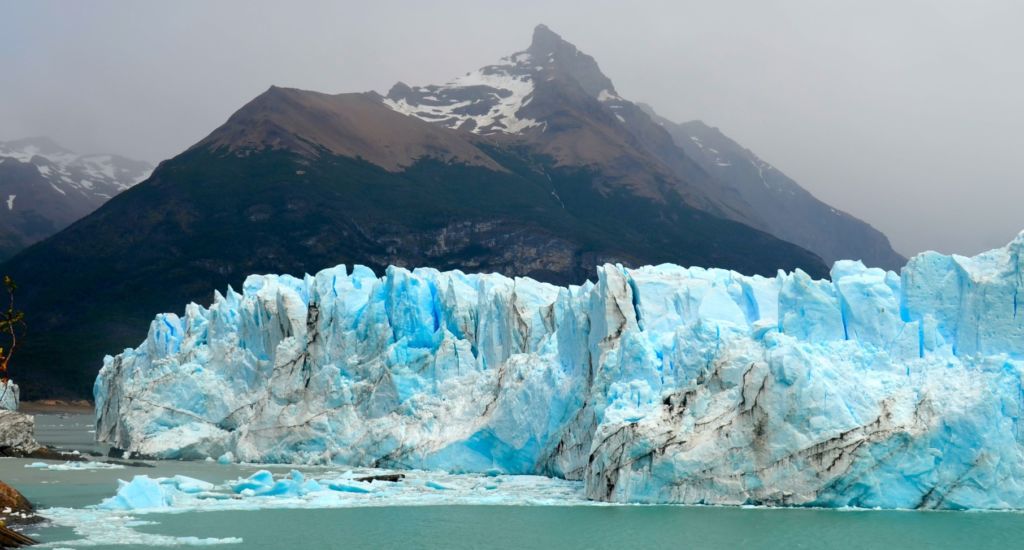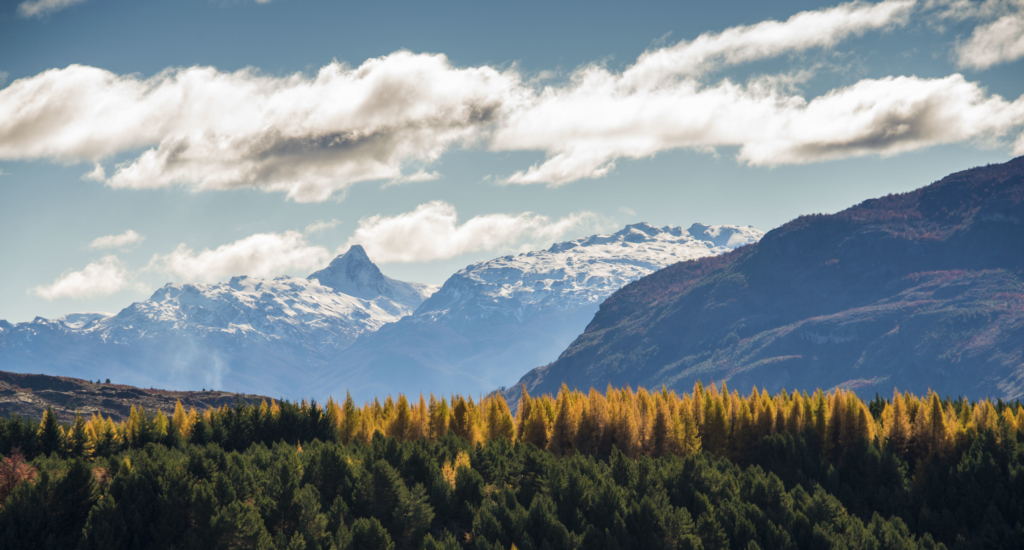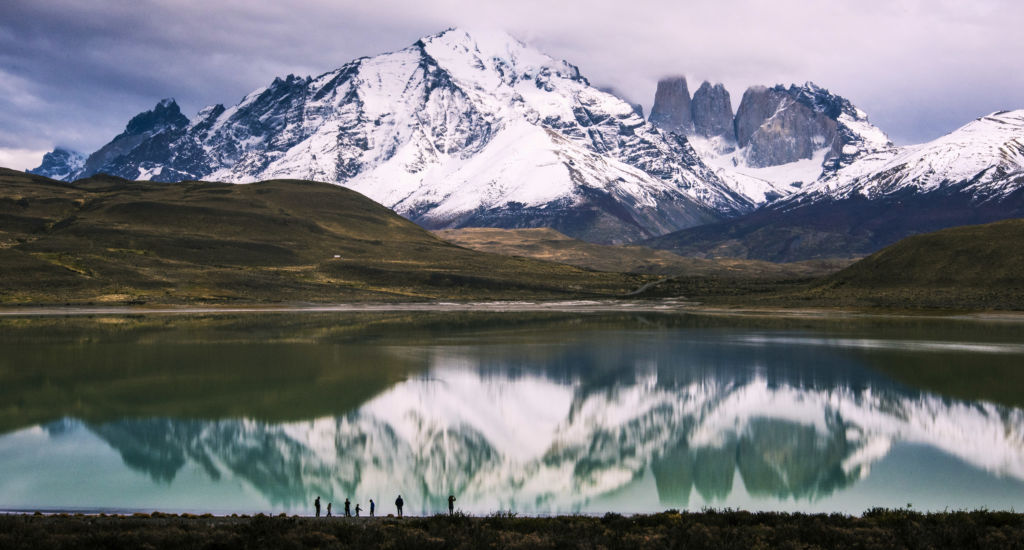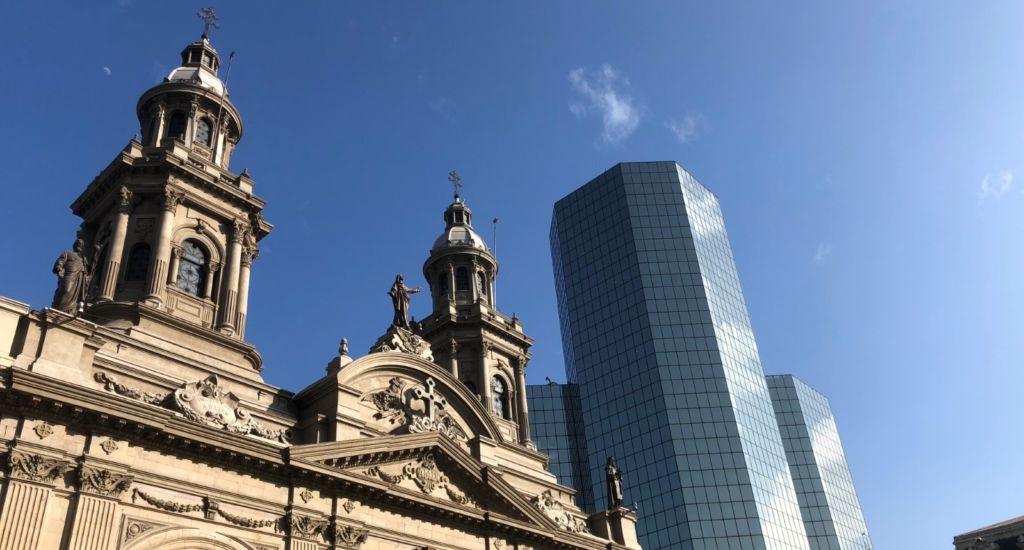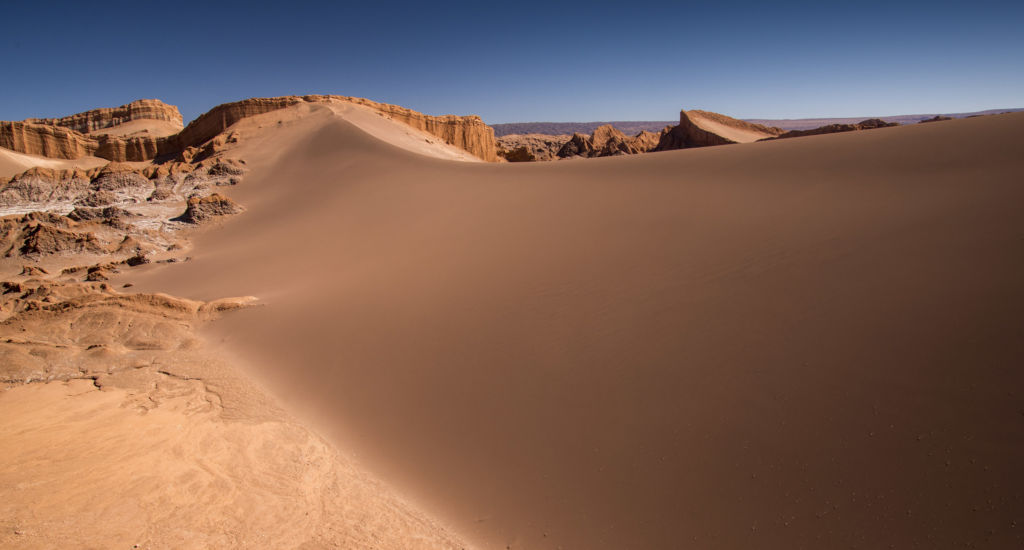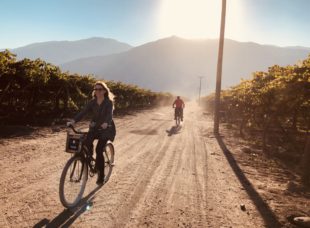Overview
With outstanding natural beauty at every turn, ribbon-shaped Chile is a true outdoor adventurer’s paradise. Stretching an astonishing length of 4300km, Chile has an extensive rugged Pacific coastline and shares borders with several South American neighbours. Bolivia and Peru lie to the north and northwest, whilst Argentina and the dramatic Andes Mountains sit to the east. Extreme changes in latitude have created a country with a truly diverse landscape; parched, arid deserts in the north contrast with fertile Mediterranean-like central valleys, whilst the south of the country offers a contrasting and mesmerising array of vast ice-fields, vibrant blue lakes and glistening glaciers.
With a heavy influence from Western European settlers, Chilean people tend to be gentler and more reserved than their neighbours in the fierier South American countries. However, scratch beneath the surface and you will find some of the friendliest and most genuine people in the world. The beauty of Chile and its inhabitants has inspired the works of many notable writers, painters and poets, such as the celebrated Nobel prize winning Pablo Neruda. These figures have left their mark on the nation and their work is documented with pride in museums and galleries dotted throughout cities and towns. It is surprising to learn that over half of Chile’s population lives in cosmopolitan Santiago, but the country’s biggest draw is the unparalleled outstanding nature of a colossal scale, which really needs to be experienced first-hand to be appreciated!
Food & Drink
Chilean cuisine can be summarised as simple, fresh and full of flavour. Standards of dining have skyrocketed in recent years, with a wonderful range of mouth-watering regional dishes on offer, as well as fine dining opportunities to rival the world’s best restaurants. When eating out in well-established restaurants and cafes, expect to pay similar prices to the UK, whereas more affordable meals can be found in informal local restaurants and markets where the locals eat. Upmarket hotels often offer all-inclusive packages, with generous multi-course menus and free-flowing alcoholic drinks.
The humble empanada, a cheese-based pastry filled with vegetables, meat or fish, is likely to feature heavily during your stay. This savoury dish comes in two distinctive varieties: horno (oven baked, resembling a small Cornish pasty) or Frito (fried and often larger in size). In rural locations, white sheets in house windows indicate that home-made empanadas are available for sale. Meat and vegetable stews are other staples, including the famous lamb and seafood curanto stew from Chilote or the chupe de jaiva, a type of crab gratin. Another Chilean favourite is a sharing platter piled high with ingredients such as chopped potatoes, avocado, tomatoes, eggs and meats. South America may not be thought of as an easy food destination for vegetarians and vegans, but fortunately Chile is a refreshing exception to the norm; the vast array of tasty fruit and colourful vegetables on offer mean the country is far more geared up to cater for a meat-free diet than some of its steak-focused neighbours!
Central Chile is a wine grower’s paradise, with sprawling lush valleys aided by year-round warm temperatures and a low pest concentration. Chile’s has over 250 vineyards which produce a variety of red and white grapes to be transformed into delicious wines, which are now gaining international attention and the world class reputation they deserve. While Cabernet Sauvignon is the most common grape variety, Chile’s more unusual speciality of Carménère must be sampled during a visit. This deep red had died out in France in the 19th Century due to temperature fluctuations but was rediscovered in Chile in 1994 – having long been mistaken for Merlot – where it was able to thrive in the country’s more moderate climate. Alongside the wine, Pisco, a grape brandy-based spirit, is also national drink and the star of the Pisco Sour. National draft beers are tasty and there is a growing market in the south, where quality craft beers are contained within beautiful bottles dedicated to each region.
When to Travel
Chile is a destination that is a joy to visit all year round. As a general guide, we think that the best time to travel falls between October and early May; as Chile stretches far into the Southern Hemisphere, the weather patterns follow the opposite seasonal conditions to those found in Europe. Warmer summer months begin in November and extend into February, with the cooler winter months falling between June and August (a time when rainfall can also spike).
Peak summer travel months of December, January and February must be booked far in advance and it is worth noting that at this time of year prices are higher, rooms are often scarce and cities can feel very crowded. These months also coincide with the local Chilean summer holidays, a time when locals jump at the opportunity to pack up and head off to explore their stunning country in droves.
Here is some further, region-specific information:
Santiago, Winelands & Central Chile: Excellent year-round travel destinations. In Santiago, daytime summer temperatures jump to 30 degrees and dip to a pleasant 15 degrees in the winter. June to August are also popular months for skiers in Santiago’s surrounding mountains.
Atacama Desert: Excellent year round travel destination. The arid desert regions of Chile see large daily fluctuations in temperature, meaning that extreme conditions should be prepared for throughout the year. Thin layers of clothing and high factor sunscreen are required to accommodate sweltering daytime temperatures, while warm coats are essential for chilly evenings.
Patagonia & Southern Chile: September to November and March to mid-May are our favourite times of year to travel to Patagonia. During these Spring and Summer months the crowds are far smaller and temperatures are especially pleasant for exploring the region. Another bonus is that the fierce summer winds tend to begin to dwindle in February and March, with the rich autumn colours that spread across the region in April and May becoming simply spectacular. Some hotels in Patagonia traditionally close their doors by the middle of May, but more and more places are bucking this trend and are staying open all year round.
Easter Island: October to April are the best months to visit Easter Island. February is the busiest time as it coincides with two weeks of local festivities held during the month. May can bring fairly damp weather, though in recent years this has been less of an issue and makes for a pleasant time to visit and avoid the crowds.
Practicalities
FLIGHTS
Chile is served by direct flights from London Heathrow to Santiago with British Airways, operating an overnight flight four times per week. The journey takes just under 15 hours; however, this will be a comfortable journey as BA use their newest and most technologically advanced aircraft, the four-class Boeing 787-9 Dreamliner, on this route.
A host of airlines also fly into Santiago via various European hubs, such as Madrid, Paris, Rome and Amsterdam, whilst LatAm also offer routes via São Paulo in Brazil. Indirect flights do cost a little less, and they often take between 18-20 hours in total to reach Santiago.
VISAS
Due to the current Coronavirus outbreak across the world please check the latest summary, health and entry requirements on the FCO Travel Advice pages here: https://www.gov.uk/foreign-travel-advice
Usual Advice: UK passport holders do not require a visa to enter Chile, providing they depart the country again within 90 days. Other nationalities should check entry requirements with the embassy. Passports need to be valid for the duration of your stay, and no further period of validity is required beyond the length of your trip.
You will be handed a rather flimsy immigration paper or ‘tourist card’ on arrival which it is vital you keep safe. Along with passports, the immigration paper will be requested upon each hotel check-in and required to leave the country. If you lose this paper, you will be required to visit a police station or return to the airport to get a replacement – please check the latest with our local partners who will be able to assist with the latest information.
If you are flying to Chile via the USA, you need to apply online for an ‘ESTA’ electronic travel authorisation, even if you are only in transit. At time of writing, this costs $14 per person, is valid for two years and should be applied for on the official Department of Homeland Security website: https://esta.cbp.dhs.gov/esta/
MONEY & TIPPING
Chile is one of the most developed, stylish and safe countries to explore in Latin America. Prices are largely comparable with those you’d expect to pay in the UK, while some remote regions such as Patagonia and Easter Island can be more expensive. The preferred currency is the Chilean Peso (CLP) and at the time of writing £1 (GBP) is worth roughly $865 (CLP). Notes of varying denominations come in multiples of $1000 (CLP), and smaller value coins are available in multiples of $100 (CLP) but are rarely enough to cover small purchases: for example, a decent coffee typically costs between $1500-$3000 (CLP).
It can be difficult to exchange GBP in remote areas, but ATMs and money exchange facilities are widely available in towns and cities. Warnings about ATM scarcity are no exaggeration in some rural locations: small airports in Patagonia, for example, do not have ATMs. If you are eating in a hotel restaurant it is usually worth charging bills to your room, as payments made in USD are often exempt from taxes for foreigners. Refreshingly, haggling is an uncommon practice away from markets. While tipping is appreciated, it is not expected as fiercely as in other areas of the continent. Be sure to check your bill in restaurants, however, as guideline tips of 10% are occasionally already included in the bill.
VACCINATIONS
You should contact your GP before travelling to all destinations. We can provide some general guidelines: however, we are not medically trained so it is essential to speak to a medical professional well in advance of your trip:
Zika Virus: there is no known risk of Zika in Chile.
Yellow fever certificate: if you are travelling to Easter Island and arriving from countries with yellow fever, you may be asked to produce a certificate of vaccination against the disease (for a list of countries affected, visit www.fitfortravel.nhs.uk)
General: it is recommended that your general boosters for Diptheria, Polio, Tetanus and Hepatitis A are up-to-date before travel. We recommend purchasing comprehensive travel insurance as soon as you have booked your holiday and declaring any pre-existing medical conditions to your insurer – some may be able to provide cover for an additional premium.
SAFETY
While Chile enjoys low levels of crime, you should exercise caution in larger cities as you would in any capital city and take a taxi back to your hotel after dark. You can also check the UK Foreign & Commonwealth Office website for the latest advice before you travel.
HORSE RIDING
Horse riding can be a wonderful way to enjoy Chile’s landscapes, but there are inherent risks involved with riding anywhere in the world. Wearing a helmet is highly recommended for your own safety – ask your guide if they are not automatically offered.
Travellers Code of Conduct
– We provide all of our clients with a “Travel Facts” document upon confirmation of your booking. This details useful facts and travel advice for your chosen destination, including restaurant recommendations, reading tips, basic language, cultural traditions, climate information and brief historical overviews. We feel that this offers a useful insight into the country you are visiting and can help you interact with local residents in a more sensitive, well informed manner. Please try to take the time to read this information before your visit, if at all possible.
– A number of the countries in which we operate holidays are religious societies with a widely observed set of customs. Always respect these norms, particularly when visiting religious buildings.
– To the best of our knowledge, all of the hotels, lodges and camps within our portfolio operate stringent measures to minimise water usage. All of our destinations have issues with water supplies to a certain extent so feel free to raise any possible wastage should you encounter it during your stays, either with the accommodation or with us upon your return.
– Please ask before taking photographs of people and respect their wishes should an individual not be happy to be photographed. We find that friendly requests and a smile are usually met with assent.
– Strive where possible to make your own contribution to environmental practices within the destination you are travelling. This might include minimising your electricity usage, avoiding smoking in protected areas, avoiding coral while snorkelling and safely disposing of all litter (recycling where possible).
– Where possible, try to purchase from local suppliers. This includes shopping for souvenirs, eating out in restaurants and booking further excursions during your free time. In areas where haggling is an accepted part of daily life, don’t become angry or offended if you are unable to obtain what you perceive as a fair price for an item. We emphasise to local suppliers that our clients should never be taken on unsolicited shopping trips, but if this does happen, try to retain your sense of humour, provide a firm refusal to participate and tell us about this on your return. We pass on all feedback from every trip undertaken with Holiday Architects to the relevant local suppliers, who share our commitment to travelling with sensitivity.
– Please don’t remove any indigenous items from their natural habitat and attempt to bring them back as a souvenir. This particularly applies to coral, shells, plants and food in the natural world, and to cultural artefacts and antiques.
– If you are unsure about anything relating to the above, please feel free to ask our local suppliers or your Holiday Architects specialist. All of these people either live or have travelled extensively in the country you are visiting and will be more than happy to offer their considered advice.


